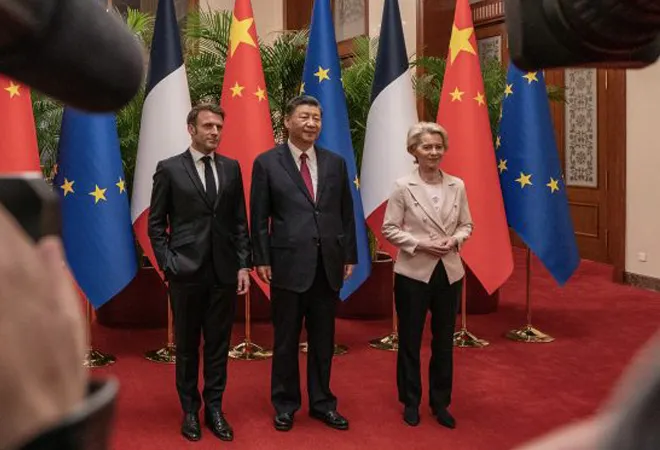-
CENTRES
Progammes & Centres
Location
Whether France can be a trusted partner in managing China is a question that many have asked after the fiasco of Macron’s visit.

That Macron asked these questions even as China is breathing down on Taiwan with an enhanced number of risky military maneuvers speaks volumes about the effectiveness of Xi’s charm offensive and the red carpet welcome that Macron received in China.Contrast this speech with Macron’s remarks after his three-day trip to China, in which he said being “caught up in crises that are not ours” is “the great risk” that Europe faces. Europe should not merely follow the United States into its crises and conflicts, the French president stressed. The worst thing, he said, “would be to think that we Europeans must become followers on this topic and take our cue from the U.S. agenda and a Chinese overreaction.” This statement speaks to France’s pet theme of strategic autonomy, a theme that resonates well in countries like India. Macron and von der Leyen were not the only European leaders in China this month. German Foreign Minister Annalena Baerbock also visited, and her line was closer to von der Leyen’s than Macron’s. During a joint press conference with her Chinese counterpart Qin Gang in Beijing, she warned against use of force on Taiwan, saying that “a military escalation in the Taiwan Strait … would be a worst-case scenario globally and affect us as one of the biggest industrial nations in particular… Fifty percent of global trade passes through the Taiwan Strait, 70 percent of semiconductors pass through the Taiwan Strait, so the free passage is in our economic interest as well.” The minister added a clear warning that “conflicts can only be resolved peacefully. A unilateral and violent change in the status quo would not be acceptable to us as Europeans.” Other German ministers have called Macron’s call for strategic autonomy “naïve,” adding that “security on European soil without the strategic nuclear potential of the United States at least is unthinkable.” The remarks from Germany’s ministers demonstrate that Berlin is not in alignment with Macron’s view questioning the need to come to Taiwan’s aid along with the United States. The EU’s foreign policy chief, Josep Borrell, who was set to travel to Beijing last week but had to cancel as he tested positive for COVID-19, also made a similar call asking China to exercise restraint on Taiwan. He said in a recent speech that “any attempt to change the status quo by force would be unacceptable.” Macron and Xi issued a 51-point joint statement, and many points in the joint statement are troubling, including references to strengthening political and military dialogue, wherein the Southern Theater of the People’s Liberation Army (PLA) (primarily responsible for South China Sea) and the Asia-Pacific Command of the French will “deepen dialogue.” Xi stated China’s “readiness to maintain close strategic communication with Macron and to elevate the China-France comprehensive strategic partnership to a new height,” while Macron “expressed readiness to continue to maintain close strategic communication with President Xi Jinping.” Macron also reportedly used the Chinese language of a “multipolar” world, that is free of “blocs,” free from the “Cold War mentality,” all of which would have been pleasing to the Chinese leadership. It was Macron’s subsequent interview that further rattled and confused many on where France stood regarding China and the broader security dynamics of the Indo-Pacific. China, of course, welcomed it, with the Foreign Ministry spokesperson, Wang Wenbin, saying “Some countries do not want to see other nations become independent and self-reliant, and instead always want to coerce other countries into obeying their will.”
Macron’s push to make Europe a significant geopolitical actor under French leadership may not find too many takers.France’s call for strategic autonomy is understandable, but it needs to be tempered with realism. Macron’s push to make Europe a significant geopolitical actor under French leadership may not find too many takers. Equally, his ability to influence and deliver on serious geopolitical developments – whether his dialogue with Russian President Vladimir Putin days before the invasion, a fruitless attempt to dissuade him from the war, or his meeting with Xi seeking China’s help in restraining the Russian military offensive in Ukraine – is questionable. Instead, his efforts at appeasing the Chinese leadership have only created more trouble for him. It is possible his gambit was all about moving beyond the present domestic anger and protests in France and certainly driven by economic necessity. He had a delegation of more than 50 business leaders who signed a number of deals including civil nuclear cooperation, and construction of a water desalination plant while France has entered into deals for selling more aircraft, financial products and pork to China. Experts argue that these could result in more jobs and thus “mollify some of the anger at home.” Parts of Europe appear to be more realistic about the China threat and the need for deterrence even as they continue to engage China, but Macron’s embrace of China may give pause to many Indo-Pacific countries. Japan, which is holding the G-7 presidency, could have concerns about G-7 unity at the upcoming summit in Hiroshima. Whether France can be a trusted partner in managing China is a question that many have asked after the fiasco of Macron’s visit.
The views expressed above belong to the author(s). ORF research and analyses now available on Telegram! Click here to access our curated content — blogs, longforms and interviews.

Dr Rajeswari (Raji) Pillai Rajagopalan was the Director of the Centre for Security, Strategy and Technology (CSST) at the Observer Research Foundation, New Delhi. Dr ...
Read More +